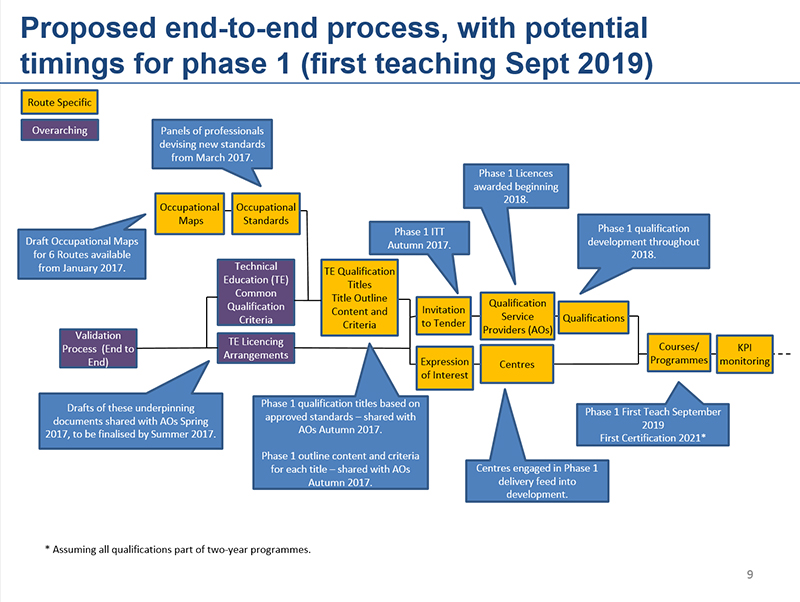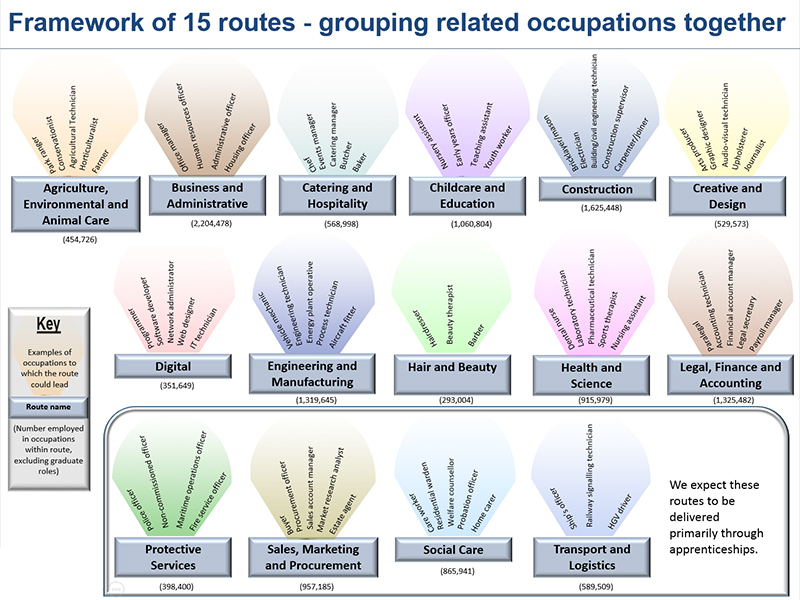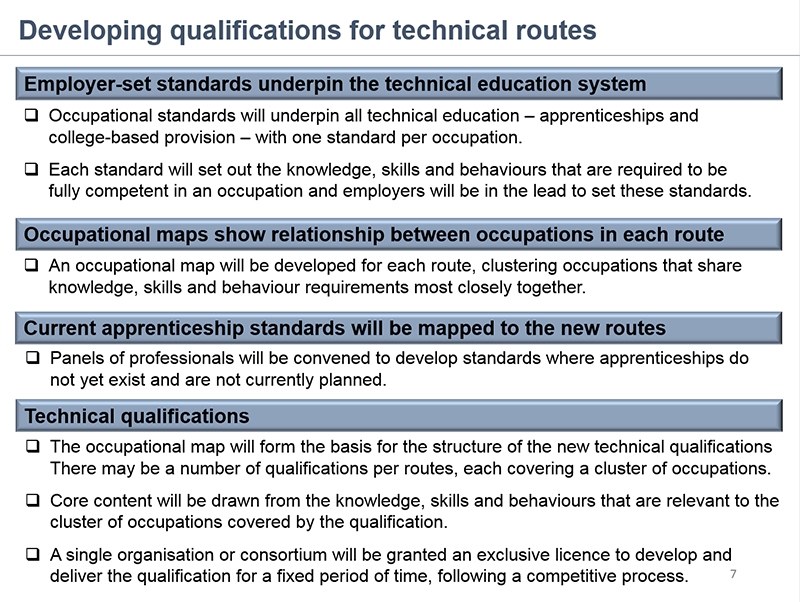The Budget will invest new funding in FE from 2019 to pay for increasing the amount of training for 16 to 19-year-olds by more than 50 per cent to over 900 hours a year.
This will come as a welcome surprise to the FE sector, as when the Sainsbury reforms were first outline in the Post-16 Skills Plan last June it was to be achieved “within current budget constraints.”
But today the Treasury has confirmed that at the Spring Budget, on Wednesday, the Chancellor will put in an additional £100m for the first teaching on new technical education routes in 2019/20 (the final year of this spending review period).
This will rise each year as more routes are introduced, until there is teaching on all 15 routes in September 2022, when the extra funding will reach an annual figure “over £500m”.
The chief executives for both the college and independent sector membership bodies enthusiastically welcomed the announcement of new funding.
David Hughes, chief executive of the AoC and writing in FE Week said he was “delighted that the Chancellor has listened” to their calls for “fair funding for colleges”.
He goes on to say: “The announcement certainly signals a step-change in thinking, backed thankfully by proper investment which will put us on a par with our international competitors” and “this announcement will make a significant and positive difference.”
The Treasury has described this “major” and “radical investment” as “the most ambitious post-16 education reforms since the introduction of A-levels 70 years ago.”
Mark Dawe, chief executive of AELP told FE Week: “The increased investment in technical skills for a post-Brexit Britain is welcome. Combined with apprenticeships, this will have a real impact.”
A statement from the Treasury concludes the post-16 skills reform “will help deliver a vision to have two genuine routes of equal footing to develop world class skills for young people; either via a well-established academic route or a technical skills route with a new and improved upgraded system – helping to build an economy that works for everyone.
However, those with not so distant memories will hope this latest reform does not repeat the failures of the 14-19 Diploma, introduced in 2008 and phased out in 2013. “The post-16 alternatives to GCSEs and A levels in schools and colleges need to be more widely available and to be credible with employers” said the 2005 White Paper, adding: “This major package of reform seizes a once-in-a-generation chance to transform 14-19 education and skills.”
The Budget will also announce the introduction of FE maintenance loans for students on courses at level 4 and above at National Colleges and Institutes of Technology, as well as “a fund of up to £40m” for “piloting new approaches to encourage lifelong learning”.
The full Treasury press release was as follows:
Shake-up to technical education to be confirmed amid major investment in skills at Budget
- Budget to prioritise the next generation, helping young people get the skills they need to secure better-paid, higher-quality jobs
- £500 million of investment every year will be committed to increase training for 16-19 year olds
A radical investment to implement the most ambitious post-16 education reforms since the introduction of A-levels 70 years ago will be placed at the heart of this week’s Budget.
The Chancellor, Philip Hammond will recognise that as the UK prepares to leave the EU, it is more important than ever that young people are ready and able to make the most of the opportunities ahead.
To give them the skills they need to secure the high-paid, high-skilled jobs of the future, he will announce a series of reforms to technical education, backed by over £500 million per year.
This will be underpinned by a transformation of the confusing current system of technical education, which is made up of around 13,000 separate qualifications. It will be replaced with a much more streamlined model of 15 world class routes that better suit the needs of students and businesses.
The government will work with employers and colleges to design these routes, from construction to creative based design professions, so that when young people leave college they have the skills, knowledge and expertise that employers want, as the Prime Minister’s modern Industrial Strategy boosts opportunities and spreads them to all sections of society and all regions of the country.
The new announcements also take the next step in the government’s plans to tackle weaknesses in the UK’s productivity levels – which the Chancellor will reiterate, is the only sustainable way to improve living standards for families up and down the country.
They will help deliver a vision to have two genuine routes of equal footing to develop world class skills for young people; either via a well-established academic route or a technical skills route with a new and improved upgraded system – helping to build an economy that works for everyone.
By pressing ahead with these reforms, the Chancellor will confirm that the government will deliver in full the recommendations of Lord Sainsbury’s review on Technical Education.
These include:
- Increasing the amount of training for 16-19 year olds on technical routes by more than 50% to over 900 hours a year, including the completion of a high-quality industry work placement during the programme. These routes will be rolled out from 2019/20 and will receive over £500 million of new funding every year once fully up and running.
- The provision of maintenance loans, like those available to university students, to students on higher technical education courses at levels 4-6 in National Colleges and Institutes of Technology. This will create real parity with the academic route.
The Chancellor will also recognise that people should have the chance to retrain and upskill at all points of their lives and the Budget will set out further steps to support this, including:
- Piloting new approaches to encourage lifelong learning to reflect the fact that the changing nature of work makes retraining and reskilling essential. A fund of up to £40m will be invested to test different approaches to do this.
- Confirming maintenance loans for part-time degree-level study to improve support available tostudents, and doctoral loans to support higher-level study. Successive reforms to the student finance system now mean that government support will be available to adults wishing to study at any qualification level, from basic skills to PhDs.
Notes for Editors
There is a strong rationale to increase the technical skills of our young people:
- There is increasing demand for intermediate and higher-level skills from employers: The CBI found that on balance, around 75% of businesses will demand more higher-level skills and around 40% will demand more intermediate level-skills.
- Closer links to the world of work are required: 66% of employers consider work experience important for those entering the labour market, yet only 30% offer work experience.
- The current system is confusing for students and employers: There are around 13,000 qualifications available for young people to choose from, many of which hold little value for either individuals or employers.
- Our technical education system is weak by international standards: only 10% of 20-45 year olds hold technical education as their highest qualification, placing us 16th out of 20 OECD countries and by 2020 the UK is set to fall to 28th out of 32 OECD countries for intermediate (upper-secondary) skills.
- And our current study programme for 16-19 year olds is smaller than leading international comparators: We currently fund 600 hours of study per year for our 16-19 year old students. This is less than countries with leading technical education systems, like Denmark and the Netherlands.





